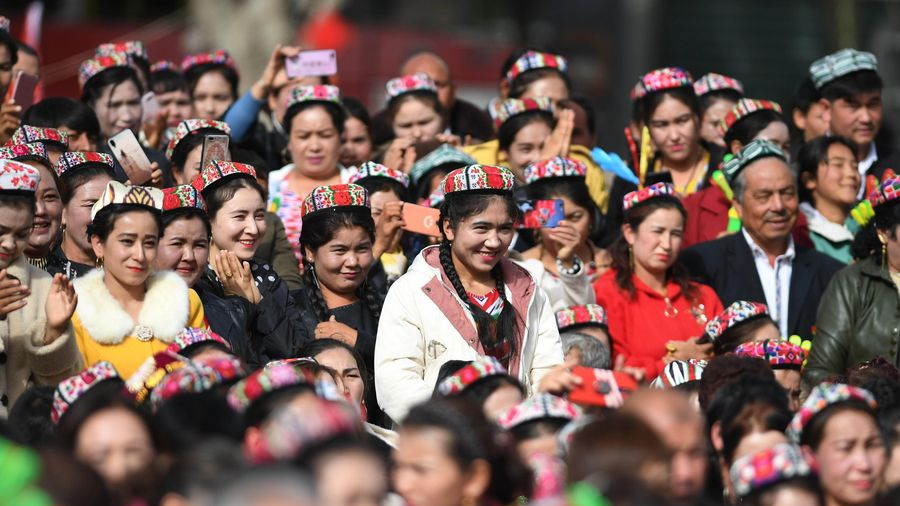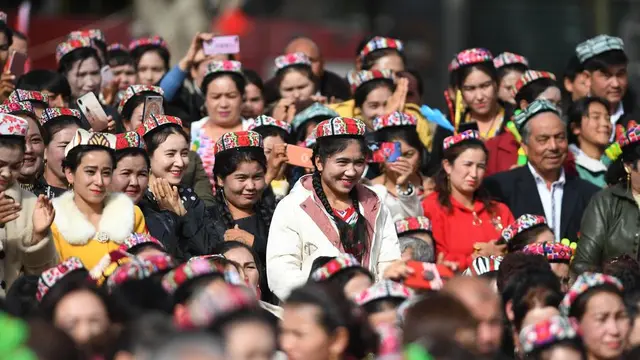
People attend a culture and tourism festival themed on Dolan and Qiuci culture in Awat County of Aksu Prefecture, northwest China's Xinjiang Uygur Autonomous Region, October 25, 2019. /Xinhua
Editor's note: Hannan Hussain is a foreign affairs commentator and author. He is a Fulbright recipient at the University of Maryland (U.S.) and a former assistant researcher at the Islamabad Policy Research Institute. The article reflects the author's opinions, and not necessarily the views of CGTN.
Hardly a week before Election Day in the United States, some senators are looking to ramp-up hostilities with Beijing by capitalizing on the anti-China card. Senators across the political spectrum introduced a resolution on October 27, which accuses Beijing of committing genocide against "Uygur, ethnic Kazakhs, Kyrgyz and members of other Muslim minority groups in the Xinjiang Uygur Autonomous Region." The overarching goal of the resolution is to lend formal recognition to a fabricated, deeply politicized narrative on Xinjiang, and at the same time, afford sheen of legitimacy to Washington's blatant interference in China's internal matters.
The dangerous myth of the alleged Uygur "genocide" has been repeatedly debunked by independent evidence, and there is little chance that toxic allegations of "imprisonment, torture and forced re-education camps" will alter reality to the contrary. Democrat Senator Jeff Merkley, one of the proponents of the resolution, offered a glimpse of the Senate's aversion to facts on Xinjiang, by construing China's peace and development in the region as "genocide, pure and simple."
The sustained growth of Xinjiang's population – a scathing indictment of the highly politicized "genocide" slander – further exposes a dearth of factual inquiry within the resolution. One of its sponsors, Republican Senator John Cornyn, claims that the resolution "recognizes these crimes [the alleged genocide] 'for what they are' and is the first step toward holding China accountable for their monstrous actions."
As evident from Cornyn's rationale, U.S. senators cling to a predetermined bias on the prevalence of an alleged genocide in Xinjiang, refusing to challenge that judgment on its merits. For instance, statistics have shown that from 2010 and 2018, the Uygur population in Xinjiang grew well in excess of 20 percent.
Such positive population progression trends resist some widely accepted indicators of genocide – such as a marked reduction in ethnic population density. Detailed studies from Harvard and Yale universities have studied population decline as an effect of genocides. As a result, Xinjiang's reality suggests it remains a legitimate and comprehensive exception to this groundless accusation.

A vendor shows newly sliced fruits at a night fair in Hotan, northwest China's Xinjiang Uygur Autonomous Region, May 18, 2020. /Xinhua
An October report by the Human Rights Institute of Southwest University of Political Science and Law in Chongqing, China, also put the spotlight on the legal and economic underpinnings of freedom in Xinjiang. Contrary to senators' claims of "escalating surveillance" and "imprisonment" of Uygurs and other Muslim minorities in the region, work-driven migration among Xinjiang employees has been frequent, economically enabling, and voluntary. These dynamics alone end the case for a so-called state-led "assault" on Uygurs, as claimed by the senators.
It will also be a mistake to interpret this fabricated genocide push in isolation from the broader politics of the Trump campaign. Co-sponsors of the October 27 resolution include the likes of Marco Rubio, a close ally of President Donald Trump on foreign policy with a pronounced anti-China bias.
More importantly, an economic equivalent of Rubio's so-called Uygur genocide endorsement serves as his controversial legislation introduced in the same week, to deny Chinese companies access to U.S. capital markets. The timing of both moves is reflective of enduring hostilities towards the Chinese government, which Rubio has deemed a "risk to U.S. economic and national security."
In the Trump administration's top brass, undermining China's sovereign interests – including the centrality of Xinjiang – has become a defining feature of the end-phase of the president's election campaigning. Prior to the resolution being introduced, U.S. Secretary of State Mike Pompeo had already intensified the campaign's disinformation offensive on Xinjiang, touting allegations of forced labor and religion restriction in the region.
In the same breath, key architects of Trump's confrontational China policy blamed Beijing for "no credible justification" on alleged "concentration camps," encouraging the same toxic parallels to genocide that the current resolution seeks to formally declare.
Therefore, by making the senate resolution coincide with the opportunistic time-frame of polarized U.S. election politics, lawmakers believe they can succeed in leveraging China's sovereignty for overt political gain.
This false hope, driven in part by a compliant national press, fails to overwhelm the well-documented positive trajectories in Xinjiang. Its crux reflects in China's outright rejection of the resolution's interference in strictly internal affairs. "The so-called genocide is a rumor deliberately started by some anti-China forces and a farce to discredit China," reiterated the Foreign Ministry on October 28.
This determination to uphold China's sovereign interests is likely to remain rock-solid in the face of all present and future U.S.-led vilification on Xinjiang, no matter what the line of argument is in Washington.
(If you want to contribute and have specific expertise, please contact us at [email protected].)
 简体中文
简体中文

